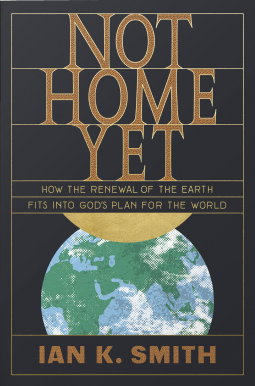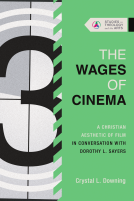
Not Home Yet
How the Renewal of the Earth Fits into God's Plan for the World
by
This title was previously available on NetGalley and is now archived.
Send NetGalley books directly to your Kindle or Kindle app
1
To read on a Kindle or Kindle app, please add kindle@netgalley.com as an approved email address to receive files in your Amazon account. Click here for step-by-step instructions.
2
Also find your Kindle email address within your Amazon account, and enter it here.
Pub Date Aug 06 2019 | Archive Date Aug 31 2019
Talking about this book? Use #NotHomeYet #NetGalley. More hashtag tips!
Description
Understanding God’s plan to renew the earth connects what Christians learn on Sunday mornings with the rest of the week—shaping their mission as they discover purpose in all their daily work here on earth.
A Note From the Publisher
PDF may not be compatible with all reading devices.
Advance Praise
“Combining pastoral, missional, and scholarly insights, Ian Smith wonderfully explores the little understood connection between the resurrection all Christians affirm and the New Creation all believers will enjoy. The result is Not Home Yet, a book with rich discussion of the interconnections of Scripture’s earliest and future themes and profound encouragement for all those who are still on their way to the home that Jesus Christ prepares for us.”
—Bryan Chapell, Pastor, Grace Presbyterian Church, Peoria, Illinois
“Not Home Yet is a compact and powerful exposition of the Bible’s teaching on earth and God’s mission to it. I have never seen such a clear articulation of the theme of creation and re-creation anywhere. Ian Smith also deftly speaks about the practical ramifications that such a teaching has on our thinking and our actions. I highly recommend this book for all who are serious about understanding this central theme of the Bible.”
—Tremper Longman III, Distinguished Scholar and Professor Emeritus of Biblical Studies, Westmont College; author, Confronting Old Testament Controversies
“When we are away from home, we long for home. But where is home for the Christian? In this insightful biblical theology of ‘home,’ Ian Smith helps us see that this world, and even heaven (as an intermediate state), is not our home—we’re just passing through, as we await our eternal home of the new heavens and the new earth. A great book to be read for the journey home.”
—Jonathan Gibson, Assistant Professor of Old Testament, Westminster Theological Seminary
“Home must surely be one of the most emotion-filled words in the English language. It is where we belong. But where is home for the Christian? Are we living in a far country here on earth, just waiting for a better day when we can leave the earth and simply enjoy heaven? Think of Ian Smith as your friendly theological realtor. He knows about the home God has created for us. With theological skill and deft simplicity, he can explain its long history. He understands where we fit into its story. He is also sensitive to the responsibility Christians have to our ‘home,’ even though we have not yet seen its final reconstruction. Brief as Not Home Yet may be, you will find it instructive and challenging beyond its size.”
—Sinclair B. Ferguson, Chancellor’s Professor of Systematic Theology, Reformed Theological Seminary; Teaching Fellow, Ligonier Ministries
“Ian Smith’s book will give you new insight into old passages, let you ponder all that is packed into Jesus’s resurrection, and get you dreaming of the new heavens and the new earth.”
—Ed Welch, Faculty and Counselor, Christian Counseling & Educational Foundation
“Not Home Yet is theologically rich yet easily accessible for anyone. Smith paints a vivid picture of how this earth matters to God—our work, our communities, and the physical world—things that some have often said are passing away and don't have eternal value. I highly recommend this insightful and much-needed book.”
—Scott B. Rae, Dean of Faculty and Professor of Christian Ethics, Talbot School of Theology, Biola University
“Ian Smith has written an eminently readable account of the biblical testimony to our eternal home—a home with resurrection bodies in a renewed heaven and earth. His careful analysis of common but ill-informed references to ‘going home’ as merely a departure from this earth, rather than a return to a renewed earth, are clear, cogent, and well argued. This concise biblical theology of death, afterlife, and resurrection should be an encouragement to every Christian reader as they grasp the fullness of the hope that awaits the people of God.”
—Glenn N. Davies, Archbishop of Sydney; author, Faith and Obedience in Romans
“When will we arrive home? That’s an emotive question, often asked in the most vulnerable experiences of our lives—when we are children, separated from loved ones, or approaching death. Answering this theological question requires exegetical precision and pastoral sensitivity. Ian Smith is a careful reader of Scripture, a gifted preacher and communicator, and a compassionate pastor. In Not Home Yet, he guides us on a journey from Eden through a world that, in its fallen state, is not our home. But the central figure in this guide book is the Lord Jesus Christ, who came to bring about a new creation.”
—Gregory R. Perry, Research Professor of Divinity, Beeson Divinity School
“Christians have a particular understanding of the world we live in because we believe that it has been created by God. We must take care of it. Ian Smith provides a theological underpinning for the kinds of actions that are required if we are to fulfill our creation mandate. This book is an important contribution to a necessary debate, and I recommend it highly to all who have a serious interest in the subject.”
—Gerald Bray, Research Professor of Divinity, History, and Doctrine, Beeson Divinity School; author, God Is Love and God Has Spoken
Available Editions
| EDITION | Other Format |
| ISBN | 9781433562778 |
| PRICE | $15.99 (USD) |
Featured Reviews
First sentence: Traveling is fun, but after a while we long for home.
Is heaven our home? For the believer should heaven be considered our home? Are we currently "not home yet"?
In Not Home Yet, Ian K. Smith argues that heaven is NOT our home. His point is technically a valid one. Heaven is not our final, ultimate HOME. After Jesus' return and the resurrection of our bodies, our final, ultimate home will be the NEW HEAVENS AND THE NEW EARTH. Smith is correct in his conclusion that the Bible speaks of a new heaven and a new earth, restored and recreated. The book celebrates the fact that the physical earth will not be destroyed or obliterated, that our final-and-forever home will be this earth. The book celebrates our future resurrection bodies.
A few weeks ago I saw a meme on Facebook. KNOWLEDGE is knowing that tomatoes are a fruit. WISDOM is knowing that tomatoes do not belong in fruit salad. I was reminded of this as I read this one. Smith seems so pleased with himself that he's discovered that heaven is NOT OUR HOME and that our eternal rest is not to be found in heaven that he just has to talk about it to anyone and everyone he meets. I think he definitely loves the shock value. I WILL RATTLE EVERYTHING YOU THINK YOU KNOW ABOUT THE CHRISTIAN FAITH. DID YOU KNOW THAT HEAVEN IS NOT YOUR HOME?!?! EVERYTHING YOU EVER LEARNED ABOUT HEAVEN FROM YOUR GRANDMA AND GRANDPA IS WRONG.
Smith's argument is that Christians should spend less time thinking about "heaven" and "things above" and the "great glory" beyond and start focusing on the earth--for it is our present home and future home. Christians priorities can be unbalanced because they don't grasp the "obvious" truth that heaven is not our home.
He also wants to make sure that your hope is not in dying "and going to heaven to be with the Lord" but your hope is in the future resurrection after Christ's return. HEY, YOU, YOU SHOULDN'T LOOK FORWARD TO HEAVEN. That's just silly. The only thing worth looking forward to is OUR FUTURE RESURRECTION WHERE WE'LL LIVE ON THE NEW HEAVEN AND THE NEW EARTH.
Here's the thing--if you read the Bible, if you read the Bible widely--Genesis to Revelation, if you read the Bible often, you already know that there will be a new heaven and a new earth. You may not have "chewed the cud" (aka meditated enough) to ponder if what we call heaven is actually heaven. But if you slow down, go step by step, stop and consider, you'll say YES, there will be a day; there will be a great day; a glorious day; I'll have a new body and a new home. I will live with the LORD and all my brothers and sisters ON THE NEW HEAVEN AND THE NEW EARTH. You can reach a biblical conclusion without all the shock and awe, without turning your "foundations" topsy, turvy.
Would his other points have come across better--a bit smoother--if he hadn't been so busy trying to shock and awe us out of ignorance?
Smith' book is about God's downward movement. (The Bible is not about us going heavenward; but God coming earthward). Smith examines Eden, the tabernacle, the temple, the incarnation, the crucifixion, the resurrection, and the second coming. He also looks at the first cataclysmic destruction of the earth--the flood--in both the Old and New Testaments. He says that believers could learn a great deal about the future "destruction" of the earth by studying the first.
Sin does not ultimately change earth's beauty or the fact that God will renew, recreate, restored. We should not let sin stop us from appreciating the fact that earth is and will be our home.
John 14 is not about "heaven" (as we know it, as opposed to HEAVEN aka new earth) but about Christ's second coming and our future resurrection.
After reading most of the book, Smith finally "grants permission" to believers to think of "heaven" as a type of home. "After Christians have died, they are away from the body, which perishes in the grave, but at home with the Lord in some sort of bodiless existence. So in the light of this, it is appropriate to refer to heaven as "home" as long as we understand that it will not be our permanent home. We still await the new heavens and new earth."
 H. C. N, Reviewer
H. C. N, Reviewer
This originally appeared at The Irresponsible Reader.
---
In the beginning, we're told, God created the heavens and the earth. As Rod Rosenbladt used to say (maybe still does, it's been a while since I heard him), "God likes matter, He made it." The Scriptures are replete with post-Fall references to God visiting Earth, coming to Earth and dwelling with His people. This is what the Incarnation and the bodily resurrection are about. Yes, the risen Christ ascends to Heaven—but He's coming back to renew the planet. That's what it's all about. The goal of humanity is not going to Heaven after we die, but to live with Him in our resurrection bodies on a renewed Earth. That's what this book is about, in a nutshell—how Creation isn't to be abandoned, discarded and therefore it doesn't matter what we do. Instead, we're caretakers of this place waiting to be renewed when our pilgrimage is complete.
Smith begins his case with Genesis 1-2 and what this tells us about God's attitude toward His creation. Then he moves on to the Fall and God's work through his redeemed people to renew the Earth, through the Flood and the covenant made with Earth, to the eventual establishment of Israel and his dwelling with His people in the Tabernacle and Temple—all of which points to the ultimate tabernacling with humanity in the person of Jesus Christ. Then Smith moves into a discussion of Christ's resurrection and what it means for His people and this world as explained by the Apostles—what it means for this world and how we should view the world.
Now, I shared the general, overall thesis of the book before I read this—but I hadn't given it much thought, and didn't see it in the kind of detail that Smith brought out. I found most of this book fascinating and relish the opportunity to give it a slower, more careful read in the future. I found the explanations and arguments carefully framed and well-reasoned. There's a chapter or two that I highlighted the majority of, and every chapter has a good amount of highlighting, the way he put certain points was very helpful. I could've used a little more depth (not possible in a book of this length, and the goal was probably something involving length to draw in—or not scare off—readers).
There are some problems with the book if you ask me. I can't buy, at all, his arguments about Genesis 6:1-4 (that "sons of God"=angels*), but as it's not pivotal to his overall argument, it's not a big deal for me (it just gave me a little pause).
* I know it's not unique to Smith, but it's rare enough that I run into it that it stuck out to me. And, no, I won't waste anyone's time debating that here, it's not that type of book. Read Bavinck for one of the quickest arguments against it, or check out Christ the Center, Episode 373.
My major reservation about this book is the lack of application—I'd have preferred a chapter or two (or four?) of "given this, how then should we live?" Smith hints at, even points toward, what the believer should do in light of this thinking. But to me, it seemed as if he was reticent to show how these ideas should affect the way that readers should put these ideas into action, how they should impact what they do from day to day—or how to think about their actions and society (ecclesiastical, political, geographic—take your pick). Yes, a good deal is self-evident, but I'd appreciate having it spelled out (if for no other reason than it'd be good to put some meat on these bones).
The book is a bit brief, and (again) I'd like to see some of what he said expanded upon, but what's there is really good, thought-provoking, faithful to the text of Scripture and consistent. It was a rewarding read, and I think it'll be an even more rewarding re-read. It's an accessible book and one that I'd encourage people to pick up and discuss.
Disclaimer: I received this eARC from Crossway via NetGalley in exchange for this post—I am grateful that both groups gave me the opportunity.
 Jeanie S, Reviewer
Jeanie S, Reviewer
Very few link the resurrection with the renewal of all things. Normally an understanding of the gospel is individualistic; it's about my salvation. The renewal brings us home with purpose.
The word renewal is word that gives hope. That the previous will pass away with a new hope for the way it was created to be. We are not home yet. There is so much implications to the renewal of all things and how it is tied to the gospel. When looked at thru those lens, salvation doesn't become about my salvation but about the Kingdom of God and his rule. A new Eden, a new earth. I was a struck anew about the new earth. What a worshipful time that will be. There will be those that will worship and those that will be in terror. God wants to be known and he has made a way to be known thru his son Jesus. There is a rebirth that brings renewal once our spiritual eyes are open.
Another aspect of renewal is repentance. Without repentance of sins and submission to the lordship of Jesus, nothing else makes sense. ..Renewal gives meaning to life. . So much taught on repentance that it can be overwhelming, however, looking at repentance as a renewal makes sense and becomes something to be embraced. I highly recommend this text.
A Special Thank you to Crossway Publishing and Netgalley for the ARC and the opportunity to post an honest review.












